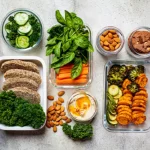
The muscle is a contractile organ that can be set in motion with contractions and relations. Our body has several trainable and modelable muscle groups.
Thus, in addition to improving health, increasing the number of trainable muscles is often the goal of many fitness enthusiasts.
Exercises with ever heavier weights lead to adjustment processes of the respective muscles, in order to be prepared again for future loads. Together with the right nutrition and sufficient regeneration, you can build muscle properly.
You may also like:
- 8 Benefits of Building Muscle
- What You Should Eat To Lose Weight And Build Muscle
- 5 Ways to Cure Muscle Tightness
How can you build muscle?
The physical adjustment processes lead to more muscle mass. A distinction is made between the gradual thickening of originally existing muscle fibers, the so-called muscle hypertrophy, and the formation of new muscle fibers, muscle hyperplasia. You can buy cheap rate any muscle build product through upcoming Cyber Monday Deals.
The fact that muscle mass grows during exercise is one of the most persistent mistakes.
Rather, the muscles regenerate in the recovery phases of the stress of training and build up more power reserves. So it comes in the next training to the desired performance increases.
Increasing loads in training also leads to adaptation reactions of the entire cardiovascular system. Targeted, full-body muscle training generates measurable increases in power and performance.
Background
The amino acids of the protein (protein) form the building blocks of the musculature and are processed in the muscle in protein biosynthesis.
That’s why boosting protein synthesis is the goal of muscle building. Put simply, if you want to build muscle, you should always make sure that you have sufficient protein in your diet.
The training of the muscles also has a positive effect on the activity of muscle protein synthesis.
However, muscle training also increases the protein breakdown rate in the muscles.
Therefore, the diet should be adapted to the goal of building muscle to see success.
An organization of muscles and strength is based on three conditions: intensive training, protein-rich nutrition, and adequate regeneration.
With appropriate energy expenditure, the respective muscle groups are able to contract or relax passively (contraction and relaxation). These movements shorten, extend, or secure the initial position of the respective muscle.
In this way growth stimuli in the muscle and minimal fiber, tears arise. The body wants to repair these cracks through the formation of new muscle tissue again and again, and it comes to an “accumulation” of new tissue. The muscles are rebuilt and grow.
The regeneration of the muscle fiber tears leads to the thickening of the muscle fiber and at the same time it comes to increases the power potential.
Classic basic exercises such as squats, covers, lunges, deadlifts, bench presses, and dips, but also other promising training elements are the first prerequisites if you want to build muscle. The second basic requirement is the right diet.
The right diet to build muscle
In training, the muscles are sufficiently stressed to set growth incentives. If it is not optimally supplied with nutrients, it will not grow.
Sufficient protein, that is protein, is the alpha and omega. This is proven by numerous sports medicine and scientific studies.
So the body should be provided with sufficient protein for a full day. The aim is to have up to five meals a day. Excellent sources of protein are poultry, eggs, fish, quark, soy products, and legumes.
(See also: The Perfect Vegetarian Diet for the Body-builder)
Protein requirement when building muscle

The benchmark is that per kilogram of body weight, at least 0.8 grams of protein per day should be consumed. On training days, the demand even increases to about 1.2 – 1.5 grams of protein 2, 3 per kilogram of body weight.
An average man with a body weight of 70 kilograms needs about 100 grams of protein for strength training throughout the day so that he can successfully build muscle.
If the need is covered by a varied diet, protein shakes can be usefully supplemented. The decisive factor is the quality of the protein powder.
We have tested the high-quality protein powder Nature Protein Plus of the manufacturer body focus within this review.
Nonetheless, natural foods are the basis of the adapted diet for muscle growth: on training days, long-chain carbohydrates from vegetables, oatmeal, and whole grains play a crucial role.
They are supplemented with short-chain carbohydrates directly after training to replenish the depleted energy stores quickly.
Immediately before training, no meals should be taken. Rather, the last meal should be about one to two hours ago. Intensive training with a full stomach significantly affects the effectiveness of the training.
After all, the blood is busy absorbing the nutrients instead of migrating into the muscles and making them more powerful.
Because the organism is busy at night with major remodeling, construction, and repair operations, lavish meals are taboo at bedtime. An evening protein shake provides over this time for a good supply of the muscles with protein building blocks.
Low-calorie diets counteract muscle building. Those who want to build their muscles and fat loss at the same time must eat protein-rich and balanced.
Drink a lot
Those who train are all the more dependent on adequate hydration. After all, the body consists of more than 60 percent water, and muscle tissue as much as 75 percent.
The regeneration
Adequate sleep is necessary to feel fresh and fit in the morning and overtraining should be avoided. Because in addition to intensive training and optimized nutrition, recovery and regeneration are the third crucial trigger, if you want to build muscle.
Only in the rest period after intensive training, the growth begins: The muscles are larger and new muscle cells are formed because the growth stimuli are processed from the training. The adaptation processes require sufficient nutrients to cope better with future stresses.
Conclusion
Targeted training, optimized nutrition, and sufficient recovery times are the basics to build muscle.
Training provides effective growth incentives that help regenerate muscle mass during recovery. The right nutrition supports the structure significantly if enough protein is consumed.
About The Author:
Rakibul Islam is a health & fitness writer with years of experience. He has written on health & fitness topics which makes me versatile enough to write on any type of content you want. He ensures that the content that will be provided to you will be of good quality and free of plagiarism.




